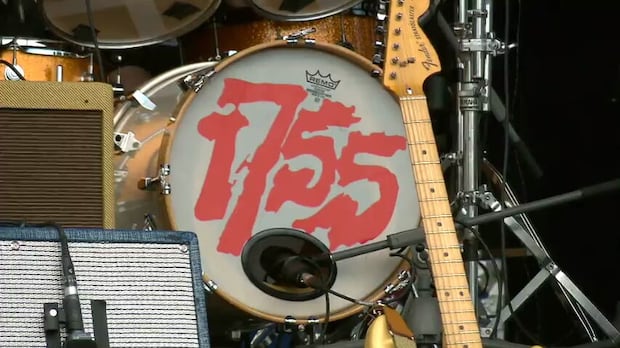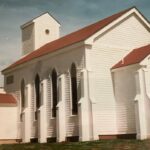New BrunswickOne of l’Acadie’s most influential groups, named after the first year of the Great Deportation from what would become the Maritime provinces, is calling it a night after 50 years in the music business. Trailblazers mixed lyrics celebrating Acadian pride with folk, country and rock soundsJordan Gill · CBC News · Posted: Oct 11, 2025 5:00 AM EDT | Last Updated: 2 hours ago1755 will take one final bow this weekend at the Capitol Theatre in Moncton. (CBC)One of l’Acadie’s most influential groups, named after the first year of the Great Deportation from what would become the Maritime provinces, is calling it a night after 50 years in the music business.1755, the trailblazing group that combined lyrics celebrating Acadian pride with folk, country and rock sounds, will hold its final shows this weekend at the Capitol Theatre in Moncton.Reflecting on the long life of the band, Roland Gauvin said he thinks the band has had a huge impact on Acadian culture.“We are constantly being told by young artists or people that are in the cultural industry of the enormous contribution that we’ve made,” Gauvin told CBC’s Information Morning Moncton.“Let’s face it, August 15th of this year, we had close to 25,000 people at our show… We’ve touched a lot of people with our music.”A matter of identityMusically the band was influenced by numerous musical groups and genres.Drummer Ronald Dupuis had a love of heavy rock, while Gauvin and Pierre Robichaud brought their love of The Eagles and The Beatles. Cheticamp’s Donald Boudreau brought a love of Cape Breton fiddle music, while mainland Nova Scotia’s Kenneth Saulnier brought his love of bluegrass and country.’We are constantly being told by young artists or people that are in the cultural industry of the enormous contribution that we’ve made,’ said Roland Gauvin. (CBC)“A little bit of everybody came out in our music, which makes it the kind of melting pot that it is,” said Gauvin.Recognition came not just in the region, but on the larger Canadian music scene as well. Perhaps the best-known of 1755’s songs, Le monde a bien changé, was inducted into the Canadian Songwriters Hall of Fame in 2022. While the musical identity of the band was fluid, with many influences, the commitment to singing in French has been a constant.“It wasn’t for any political thing whatsoever. It was because it was who we were,” said Gauvin.Changing timesWhile Moncton has always had a strong French population, that doesn’t mean the language was always given the respect it deserves.Pierre Robichaud said when the band first started, you couldn’t freely speak French while going about your day.’It was taken for granted that even if it was a French clerk that was going to serve you, you’re going to speak in English to each other,’ said Robichaud. (CBC)“It was taken for granted that even if it was a French clerk that was going to serve you, you’re going to speak in English to each other,” said Robichaud.And the city’s hostility to French followed Robichaud and Gauvin when they were first performing, especially at the Chris Rock Tavern, what Robichaud described as “the most Anglophone tavern in Moncton.” Three guys waited for us with a baseball bat and tire irons and said, ‘Come on, frog, you wanna fight?’- Pierre RobichaudWhile the duo were performing covers in English, their French banter did not go over well with some patrons.“We’d be shouted at, [by people] saying, ‘Speak white!’” said Robichaud.“Three guys waited for us with a baseball bat and tire irons and said, ‘Come on, frog, you wanna fight?’”A controversial nameWhile the band caused consternation among some anglophones in the city, the Acadian establishment also had its own axe to grind with the band, over its nameRobichaud said band members shot down a bunch of suggested names including Deluxe French Frogs (a play on Deluxe French Fries) and Grand Dérangement, the French term for the British expulsion of the Acadians from what would become the Maritimes, as well as parts of MaineA painting depicting the expulsion in Gauvin’s home inspired the name: “1755 [was] written on the bottom of it, and by process of elimination we ended up choosing 1755,” said Robichaud.Members of 1755 performing in 1979. (CBC)The name had two benefits. It was a number, so it could be easily understood in both French and English, and it identified the band as Acadian. While the name may seem innocuous today, it was controversial at the time.”It’s like a band … of Jewish guys coming out and putting out a band called the Holocaust,” said Gauvin.“We were criticized for that at first… A lot of people said, ‘Sacrilege!'” said Robichaud. “A couple of years later the same people would say, ‘Wow, you couldn’t have chosen a better name.’”And then there was the band’s liberal use of chiac, a French patois that contains many English and Mi’kmaq words. Robichaud said the Acadian establishment wasn’t “very impressed” by that, but the people were.“I think the people themselves, excluding the establishment, found themselves in our lyrics,” he said. “They found they could recognize themselves and the way they spoke.”ABOUT THE AUTHORJordan Gill is a CBC reporter based out of Fredericton. He can be reached at jordan.gill@cbc.ca.With files from Information Morning Moncton
Acadian legends 1755 saying ‘au revoir’ after 50 years










